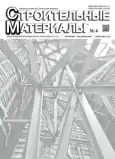Прогнозирование износа строительных конструкций с использованием логистической модели ремонтно-восстановительных работ
- Авторы: Попова О.Н.1
-
Учреждения:
- Северный (Арктический) федеральный университет им. М.В. Ломоносова
- Выпуск: № 4 (2025)
- Страницы: 73-80
- Раздел: Статьи
- URL: https://gynecology.orscience.ru/0585-430X/article/view/682915
- DOI: https://doi.org/10.31659/0585-430X-2025-834-4-73-80
- ID: 682915
Цитировать
Полный текст
Аннотация
Целью исследования явилась разработка методов идентификации технического состояния строительных элементов для оптимизации планирования и выполнения ремонтно-восстановительных работ на этапе эксплуатации. Современные исследования в области мониторинга технического состояния строительных объектов традиционно фокусируются на физических характеристиках материалов и конструкций, что ограничивает их практическое применение для задач массового планирования ремонтных работ. Эксплуатационные службы, напротив, требуют методик, основанных на доступных данных (визуальный осмотр, история ремонтов), позволяющих оптимизировать бюджетное планирование в рамках программ капитального ремонта. Разработанный метод фазового анализа, основанный на логистической модели износа, использующий динамику ремонтных затрат, предлагает решение этой проблемы, сочетая объективность технической оценки с практическими потребностями эксплуатационных организаций. Алгоритм идентификации переходов между фазами деградации по объективным критериям включает: расчет скоростных характеристик деградационных процессов; определение точек перегиба на кривых износа; оценку остаточного ресурса для различных типов конструкций. Посредством расчета годовых коэффициентов роста стоимости , их среднего геометрического значения и относительных отклонений устанавливаются три характерные фазы деградации: начальная, ускоренная и критическая. Данный подход обеспечивает раннее выявление элементов с нелинейным ростом затрат на восстановление. Произведена апробация модели для различных строительных элементов здания. Приведены рекомендации оптимизации ремонтной стратегии на основе фазовых состояний логистической кривой износа строительных конструкций.
Полный текст
Об авторах
О. Н. Попова
Северный (Арктический) федеральный университет им. М.В. Ломоносова
Автор, ответственный за переписку.
Email: oly-popova@yandex.ru
канд. техн. наук, доцент
Россия, 163002, г. Архангельск, наб. Северной Двины, 22Список литературы
- Леонович С.Н. Механика долговечности конструкционного бетона: новый подход к явлению деградации. Ч. 2. Коррозия арматуры // Строительные материалы. 2024. № 8. С. 11–16. EDN: JOWDXW. https://doi.org/10.31659/0585-430X-2024-827-8-11-16
- Панченко Ю.Ф., Панченко Д.А., Медведева Э.Н., Зелиг М.П., Илясова С.В. Поведение силикатного кирпича при длительном контакте с грунтом // Строительные материалы. 2024. № 7. С. 60–64. EDN: TFTDGP. https://doi.org/10.31659/0585-430X-2024-826-7-60-64
- Аниканова Т.В., Погромский А.С., Павленко Н.В. Применение теории переноса при исследовании долговечности теплоизоляционных материалов // Строительные материалы. 2024. № 6. С. 21–25. EDN: CMUTRQ. https://doi.org/10.31659/0585-430X-2024-825-6-21-25
- Пинус Б.И., Корнеева И.Г. К вопросу усталостной классификации цементных композитов // Строительные материалы. 2024. № 6. С. 73–76. EDN: TXQLRL. https://doi.org/10.31659/0585-430X-2024-825-6-73-76
- Шмелев Г.Д., Сазонов Э.В., Кононова М.С. Мониторинг и прогноз технического состояния строительных конструкций зданий и сооружений // Жилищное хозяйство и коммунальная инфраструктура. 2021. № 3 (18). С. 9–18. EDN: ROYHMD. https://doi.org/10.36622/VSTU.2021.18.3.001
- Гурьев В.В., Дорофеев В.М., Лысов Д.А., Акбиев Р.Т. Основы мониторинга строительных объектов в период эксплуатации с использованием анализа изменения их динамических параметров // Academia. Архитектура и строительство. 2021. № 3. С. 89–100. EDN: NJDSLL. https://doi.org/10.22337/2077-9038-2021-3-89-100
- Гурьев В.В., Гранев В.В., Дмитриев А.Н. Опыт применения автоматизированных станций мониторинга на уникальных строительных объектах // Промышленное и гражданское строительство. 2021. № 12. С. 6–14. EDN: HUZXPJ. https://doi.org/10.33622/0869-7019.2021.12.06-14
- Кобелев Н.С., Ступишин Л.Ю., Масалов А.В. Дистанционный мониторинг состояния несущих конструкций покрытий зданий и сооружений в виде железобетонных куполов // Известия Юго-Западного государственного университета. Сер.: Техника и технологии. 2011. № 1. С. 32–35. EDN: QYUOKZ
- Минаков А.А., Николенко С.Д., Сазонова С.А. Анализ состояния многоквартирных домов // Моделирование систем и процессов. 2021. Т. 14. № 4. С. 67–75. EDN: KGVUPJ. https://doi.org/10.12737/2219-0767-2021-14-4-67-75
- Климов А.Н. Прогноз развития напряженно-деформированного состояния конструкций высотного здания на основании данных системы мониторинга // Жилищное строительство. 2013. № 11. С. 13–16. EDN: PROOZW
- Давидюк А.А., Артемьев Е.А., Стрельцов С.А., Восканян Р.С. Современные методы оценки технического состояния инженерных систем зданий // Жилищное строительство. 2020. № 12. С. 36–39. EDN: ZNUFVN https://doi.org/10.31659/0044-4472-2020-12-36-39
- Numan M. Advancements in structural health monitoring: a review of machine learning approaches for damage detection and assessment // International Journal for Computational Civil and Structural Engineering. 2024.Vol. 20, No. 1, pp. 24–142. EDN: QUUANL. https://doi.org/10.22337/2587-9618-2024-20-1-124-142
- Jin S. Research on the application of machine learning in predictive maintenance of building structures. Artificial Intelligence for Future Society: Proceedings of the AIS 2024. Cham: Springer, 2024. Vol. 41, pp. 381–391. https://doi.org/10.1007/978-3-031-69457-8_35
- Zhong D., Xia Z., Zhu Y., Duan J. Overview of predictive maintenance based on digital twin technology. Heliyon. 2023. Vol. 9. No. 4. e14534. EDN: GLXEFV. https://doi.org/10.1016/j.heliyon.2023.e14534
- Bouabdallaoui Y., Lafhaj Z., Yim P., Ducoulombier L., Bennadji B. Predictive maintenance in building facilities: a machine learning-based approach. Sensors. 2021. Vol. 21. No. 4. 1044. EDN: HCWRIR. https://doi.org/10.3390/s21041044
- Попова О.Н., Симанкина Т.Л. Методика оценки ресурса работоспособности конструктивных элементов жилых зданий // Инженерно-строительный журнал. 2013. № 7 (42). С. 40–50. EDN: RHAJJR. https://doi.org/10.5862/MCE.42.6
Дополнительные файлы









